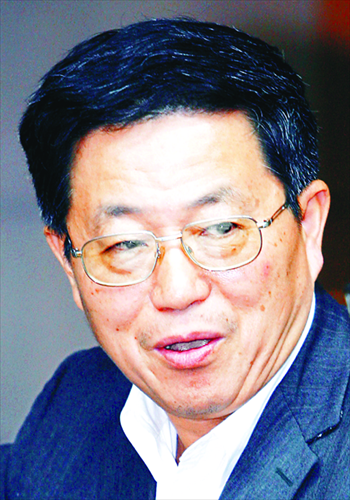Structural advances push new reforms

Chi Fulin
Editor's Note:
As policy advisors and decision-makers gather for the two sessions, world attention turns again to how China will comprehensively deepen reforms and overcome obstacles ahead. Global Times (GT) reporter Li Aixin talked to Chi Fulin (Chi), a member of the National Committee of the 12th Chinese People's Political Consultative Conference and director of the China (Hainan) Institute for Reform and Development on China's reform prospects.
GT: What are the new characteristics of China's reforms since the third plenum of the 18th CPC Central Committee?
Chi: From the plenary meeting in 2013 till now, a social environment for comprehensively deepening reforms has been formed. From simplifying administrative procedures and delegating power to lower levels, taking faster and comprehensive steps to promote the rule of law, to the new progress of the Free Trade Area of the Asia-Pacific, a number of new achievements have laid a solid foundation for China's further reforms.
The reforms are now guided by our problems. For example, we have made a major historical breakthrough in balancing the relationship between the government and the market.
Meanwhile, the reforms have been implemented promptly and decisively when the time is right, without any dawdling, such as our measures to adjust the wages of executives of State-owned enterprises. We are paying more attention to people's livelihood and are introducing reforms to our hukou (residence permit) system as well as the national college entrance examination system.
GT: What is our main focus of deepening reforms in 2015?
Chi: China needs to form a structural as well as systematic "new normal" through reforms. China's economic performance is now entering a "new normal," with a growth rate around 7 percent. However, some structural and systematic problems, which constrain the sustainable economic development, still exist. We could only guarantee a stable and sustainable economic development by forming a structural and systematic "new normal."
We also need to solve the problems of economic innovation, restructuring and upgrading. In the next few years, we will face three trends of economic development, which are the industrial transformation that shifts the focus of "Made in China" from quantity to quality, a people-oriented urbanization transformation, and a consumption structure transformation that shifts the priority from a material-oriented to service-oriented approach.
GT: What breakthroughs could be achieved in our reforms in 2015?
Chi: We could reach some breakthroughs in five areas this year. Government reform, which focuses on the transformation of the administrative approval system, is expected to achieve huge progress, including gradually and comprehensively launching a negative list, and the lists of responsibility, power as well as fiscal expenditure. Market-oriented reform will become a priority, in order to give full play to the decisive role of the market in resource allocation. Fruitful results in the reform of enterprises, especially State-owned enterprises are expected. There will also be a breakthrough in structural reforms over financial and monetary policies. Last but not least, the "One Belt, One Road" initiative will see substantial progresses.
GT: What challenges are ahead in further deepening these reforms?
Chi: The reforms involve profound changes to the working principles of the government, which will bring the huge restructuring of interests among each department, administration, local government, and industry. A certain resistance will appear. This is a challenge that requires stronger efforts.
In the light of this, we need to add pilot programs into the top reform design. Every reform requires experimenting, and only by combining the top design with local experiments, and putting emphasis on the enthusiasm and creativity of grass-roots, could we promote the comprehensive reform.
Moreover, we should combine the ideas of the central government with the reality of local areas. Most of the reforms come from the consolidated deployment of the central government. However, more flexibility is needed to take a region's own problems into account.
Thus, local governments must shoulder more responsibilities to bring the initiative, wisdom and power of both the central government and local people into full play, by exploring its own path of development.
In addition, we need to realize that reforms outweigh the individual interests of each department. Some departments and industries feel reluctant to push forward reforms when it comes to the readjustment of their interests, which has been stalling the reform process. Therefore, overall coordination should be strengthened.
Finally, integrating the reforms with legislation is required, to allocate responsibilities for advancing reforms and to push the reform forward through top-down initiatives.